Help support Cork Safety Alerts by becoming a ‘Supporter’ and donating a small amount each month to help with the running of our website, server and organisation! Click here to become a CSA Supporter.
Taoiseach Leo Varadkar spoke to the nation this evening ahead of the 5th May 2020 and has outlined plans for the easing of restrictions in the Republic of Ireland. The easing of restrictions will take place in 5 phases, with the fifth phase to start on August 10th.
Taoiseach Leo Varadkar has said that the current restrictions have been extended until May, 18th 2020, with the following changes:
- Those cocooning, aged over 70 will be allowed to leave the house for exercise (within 5km) avoiding contact with other people. Effective from Tuesday 5th May.
- The current 2KM limit for exercise will be extended to 5KM from Tuesday, 5th May.
- Social Distancing measures will remain in place until such time as a vaccine has been created.
- On the 18th May, Ireland will begin to begin to reopen. Construction workers, Garden Centres, DIY/Hardware Stores to begin to reopen.
- It will be possible to meet small gatherings of friends and family from the 18th May, while adhering to Social Distancing guidelines.
- Schools and colleges will begin to open in September at the beginning of the new academic year.
Full Roadmap for Reopening Society & Business:
INTRODUCTION
Not for generations has Ireland been faced with a health threat as serious as COVID-19 and the daily life of every single person has been changed. In the early weeks, as this pandemic was emerging, Government and our health and social care service monitored the evolving global situation, deployed our plans and started to prepare for the disease’s likely impact in Ireland. At the same time, businesses, organisations, communities, families and each of us individually were becoming informed, changing our individual and collective behaviours so that we would know what to do, and do the right things as COVID-19 found its way closer.
Within a very short few weeks after the first cases of COVID-19 were reported in Ireland at the end of February 2020, as with other EU countries, it became necessary to take unprecedented steps to control the disease. A tiered approach of public health social distancing measures was first advised by An Taoiseach on 12 March, and these measures were further strengthened on 24 March and again on 27 March, extended to 5 May to continue to suppress transmission of the virus.
We have been working with a range of Departments and stakeholders to draw up a roadmap for modifying restrictions imposed to combat the COVID-19 pandemic. This Roadmap includes:-
- A sequence of actions to re-open the economy and society
- A decision-making framework for Government
- A process for engaging with unions, employers and other representative groups to build aco-operative approach to re-opening workplaces and other facilities
- An updated economic policy response
- Updated response on other pressing societal concerns
- Travel and international co-operation
The Roadmap is guided by a number of over-riding principles. That is, an approach which is:- Safe –informed and guided by a public health assessment of risk
Rational – includes consideration of the social and economic benefits and impacts of any modifications of restrictions and their feasibility
Evidence-informed – uses all of the data and research available to us to guide thinking Fair – Ethical and respects human dignity, autonomy and supports equality
Open and transparent – decisions are clear, well communicated and subject to the necessary checks and balances
Whole of Society – based on the concept of solidarity and supporting cohesion as we exit over time
SEQUENCE OF ACTIONS TO RE-OPEN THE ECONOMY AND SOCIETY
Public health should always be clearly and transparently provided as part of the decision-making process to inform Government on the slow unwinding of the restrictions. It will be a risk-based approach, considering risk both from the perspective of protecting those most vulnerable to infection as well as protecting against causes, situations, circumstances, and behaviours that may lead to risk of spread of disease.
The role of the National Public Health Emergency Team in assessing the public health risk has been critical and will continue to guide Government while we are living with this Pandemic. The Report of the NPHET is published in full as an accompanying document to this Roadmap. That Report outlines 5 phases and the triggers which will allow us to progress from one phase to the next.
The Government accepts the recommendations of NPHET and the overall framework provided. The triggers and framework for a phased reduction of restrictions are reproduced here.
Public Health Framework Approach to advising Government regarding reduction of measures
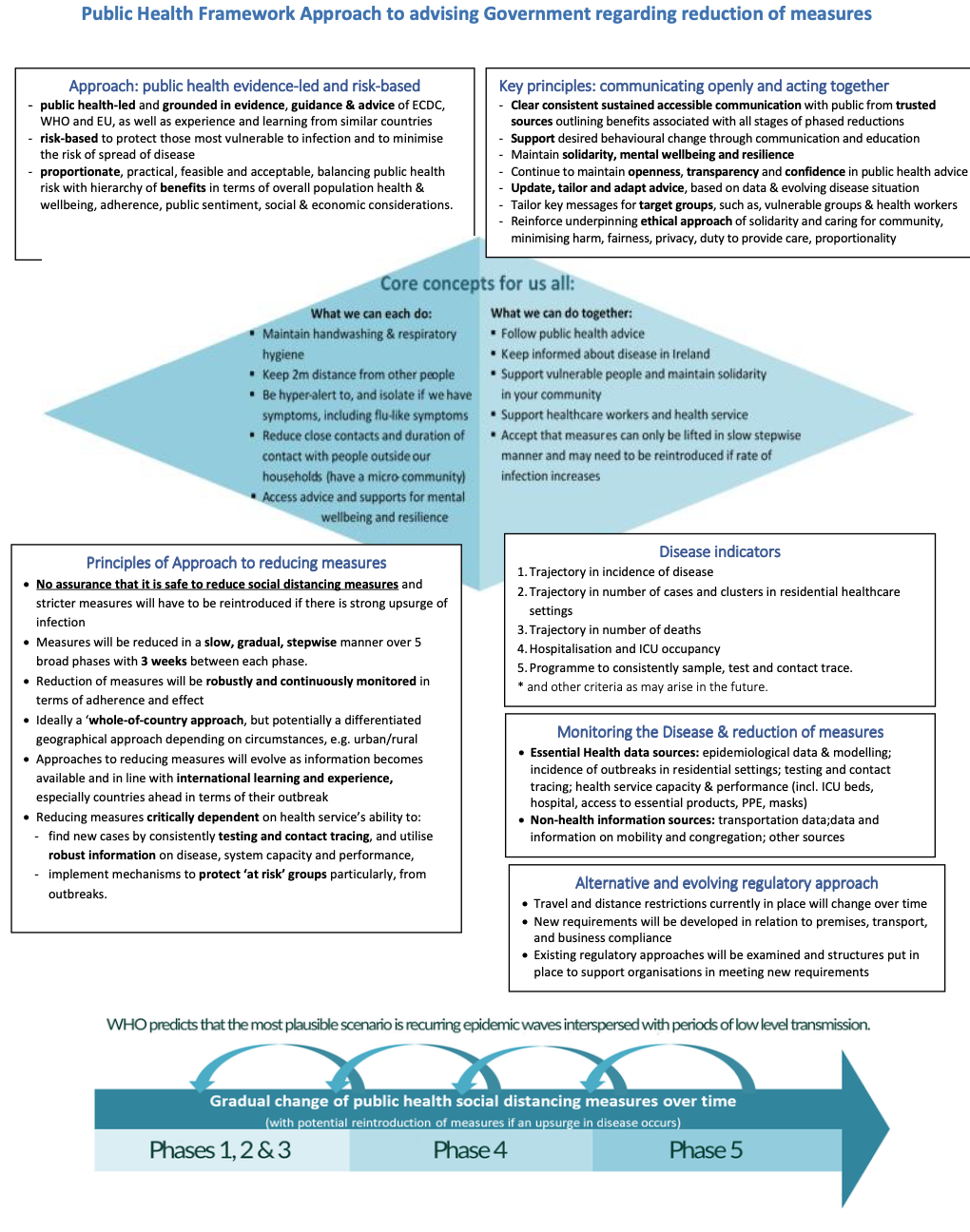
Guide to the NPHET public health framework approach to reducing public health social distancing measures
The National Public Health Emergency Team’s (NPHET) Public Health Framework is a living document and will be subject to regular review in the context of the progression or suppression of the disease in Ireland at different points in time; new guidance and evidence which emanate from the research, experience and findings of international bodies and of other countries.
This framework approach contains a range of indicative measures set out under a number of different headings (categories) and across a number of potential phases. Over the coming period, as NPHET monitors the progress of the disease, these are intended to provide the NPHET with a flexible menu of possible options to consider, in providing public health advice to Government regarding the adjustment of social distancing measures.
- – Under each heading, a number of phases are set out. These are broadly considered to be sequential under each heading. However, the categories can be read independently of each other (for example a middle phase Education measure might be started before a middle phase Social / Recreational measure, depending on the circumstances at the time).
- – Recommendations to action a measure under one phase does not mean that all other measures in the same phase under that heading will necessarily be recommended for activation. The framework is intended to be applied flexibly, so that it would be open to the NPHET, at any point in time, to recommend measures from later phases depending on the prevailing circumstances.Ongoing two-way communication with the public will be essential to ensure that–
- – the public are informed of the changes in restrictions as approved by Government, and the social distancing and other measures that are in place at each phase;
- – there is clear and coherent information about the public health rationale and an explanation of changes made by Government, with a view to encouraging adherence with measures;
- – feedback mechanisms are in place to better understand the measures which work most effectively, areas of challenge, opportunities to innovate in protecting the safety of people while progressing towards a return to economic and social life.The purpose of this public health framework approach is to inform a slow, gradual, step-wise and incremental reduction of the current public health social distancing measures, in a risk-based, fair and proportionate way with a view to effectively suppressing the spread of COVID-19 disease while enabling the gradual return of social and economic activity.This framework also acknowledges that there are other important considerations regarding the reduction of measures that Government will have, such as social and economic considerations, adherence, public sentiment, acceptability, feasibility, overall population health & wellbeing and others.
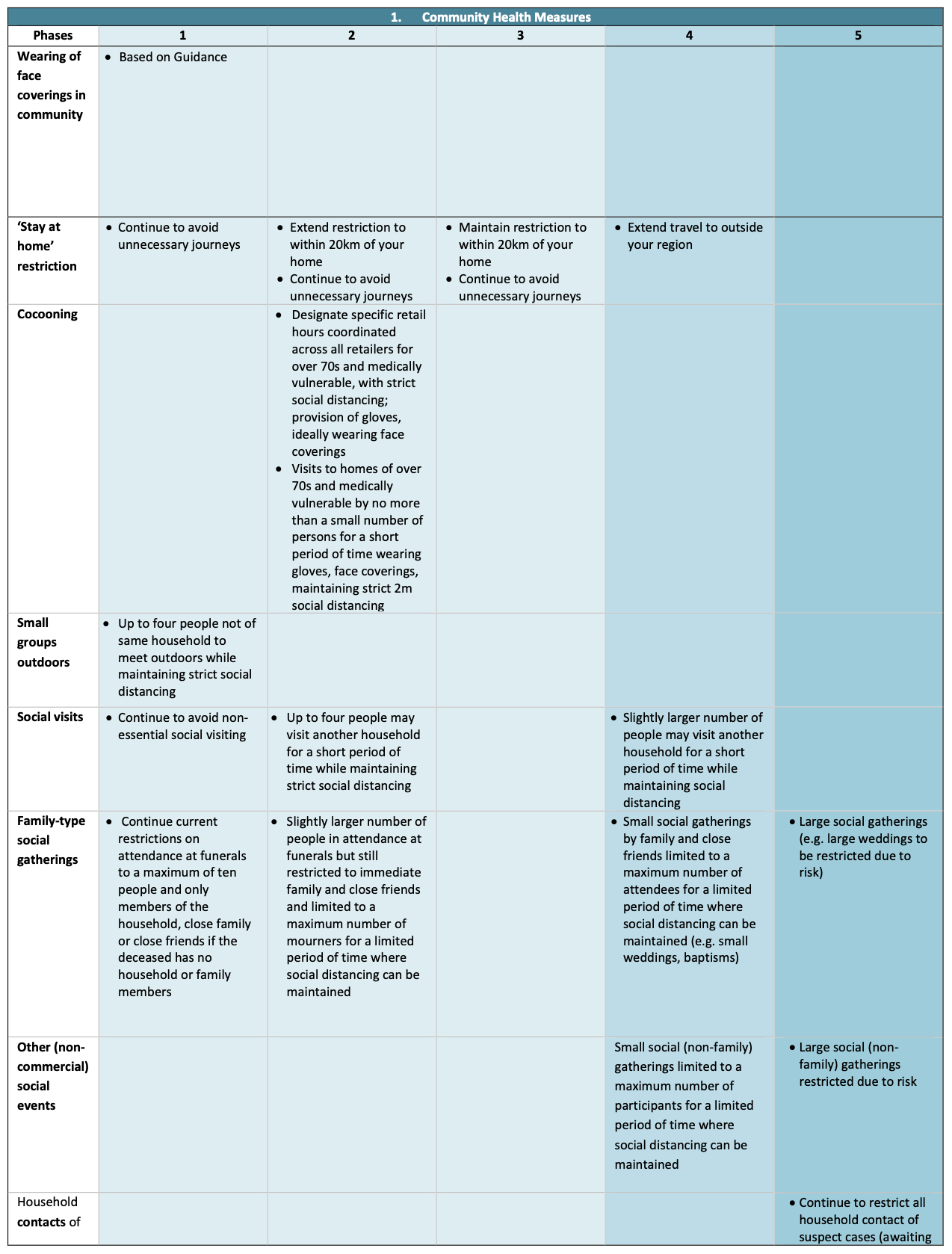
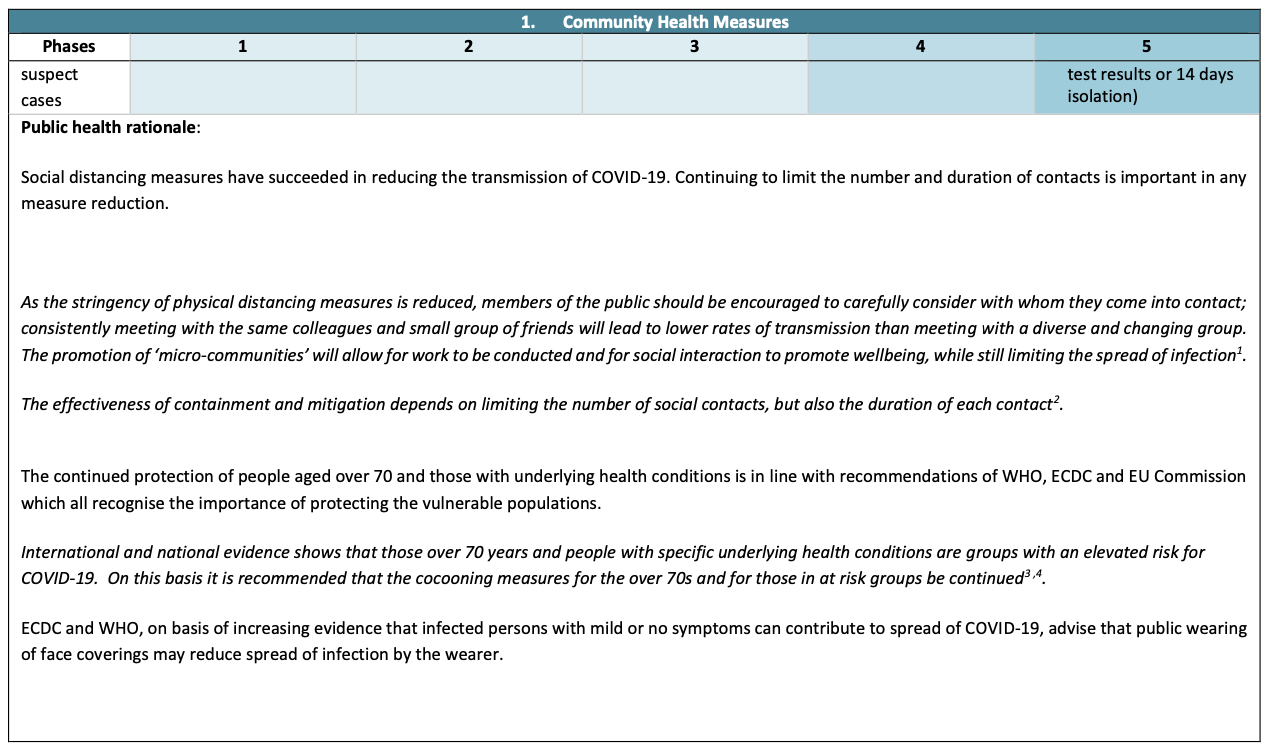
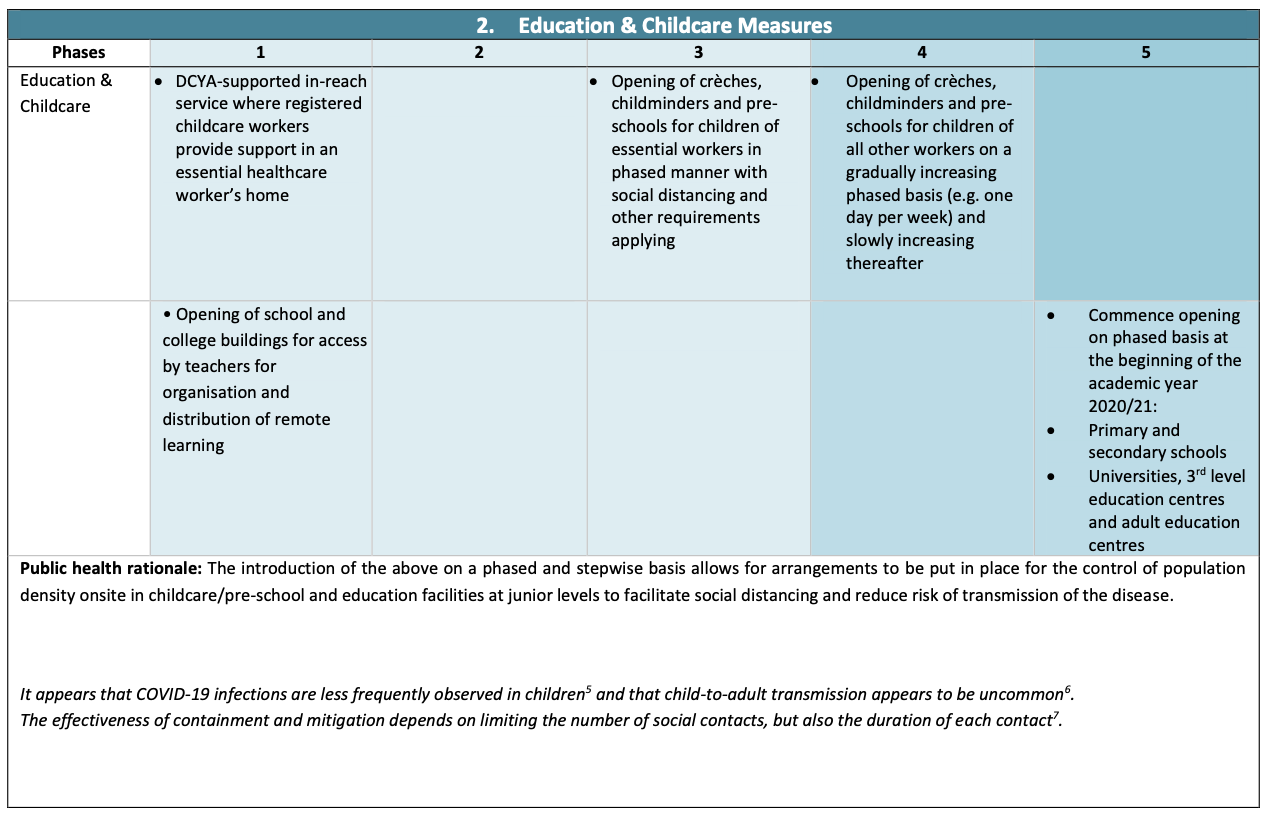
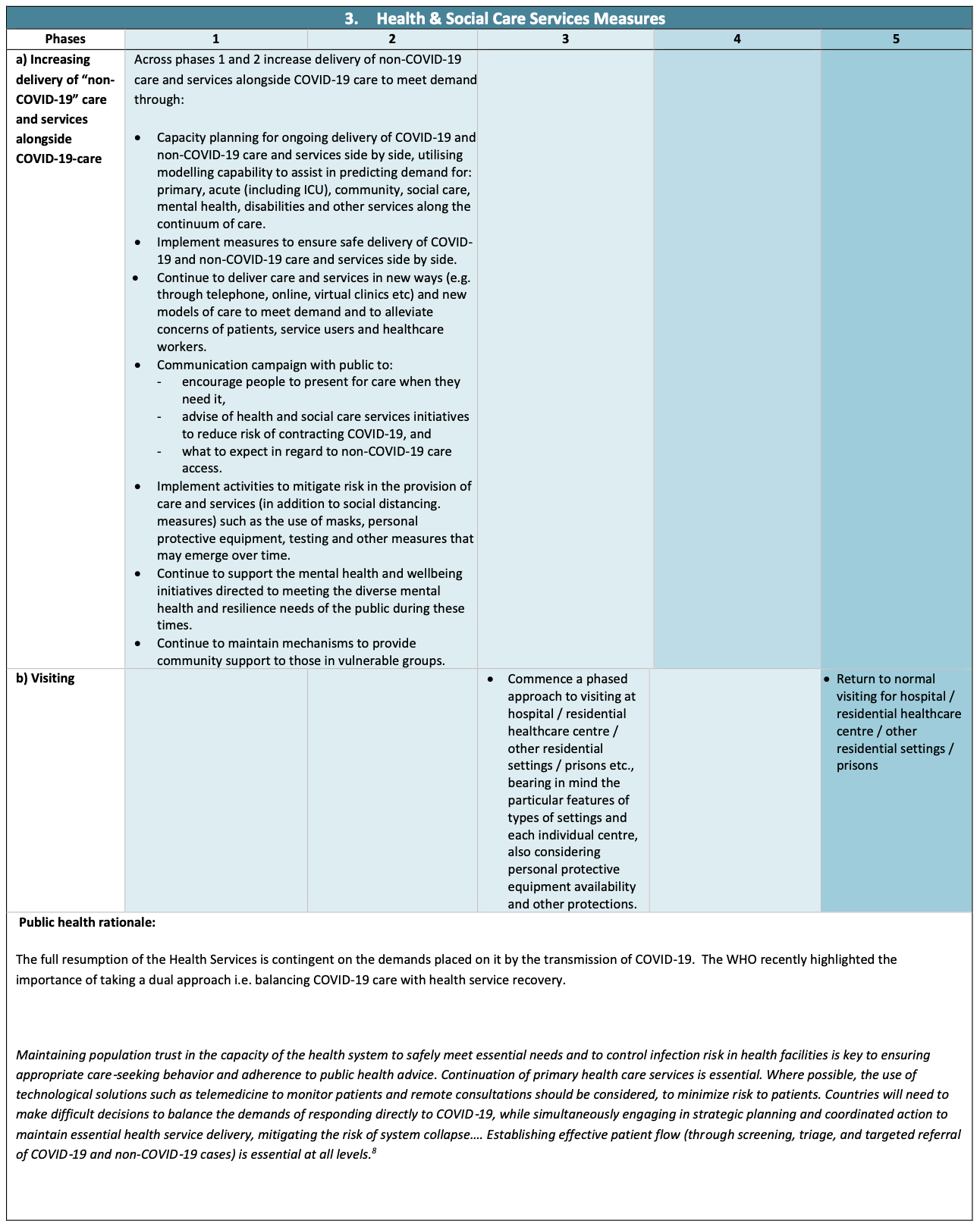
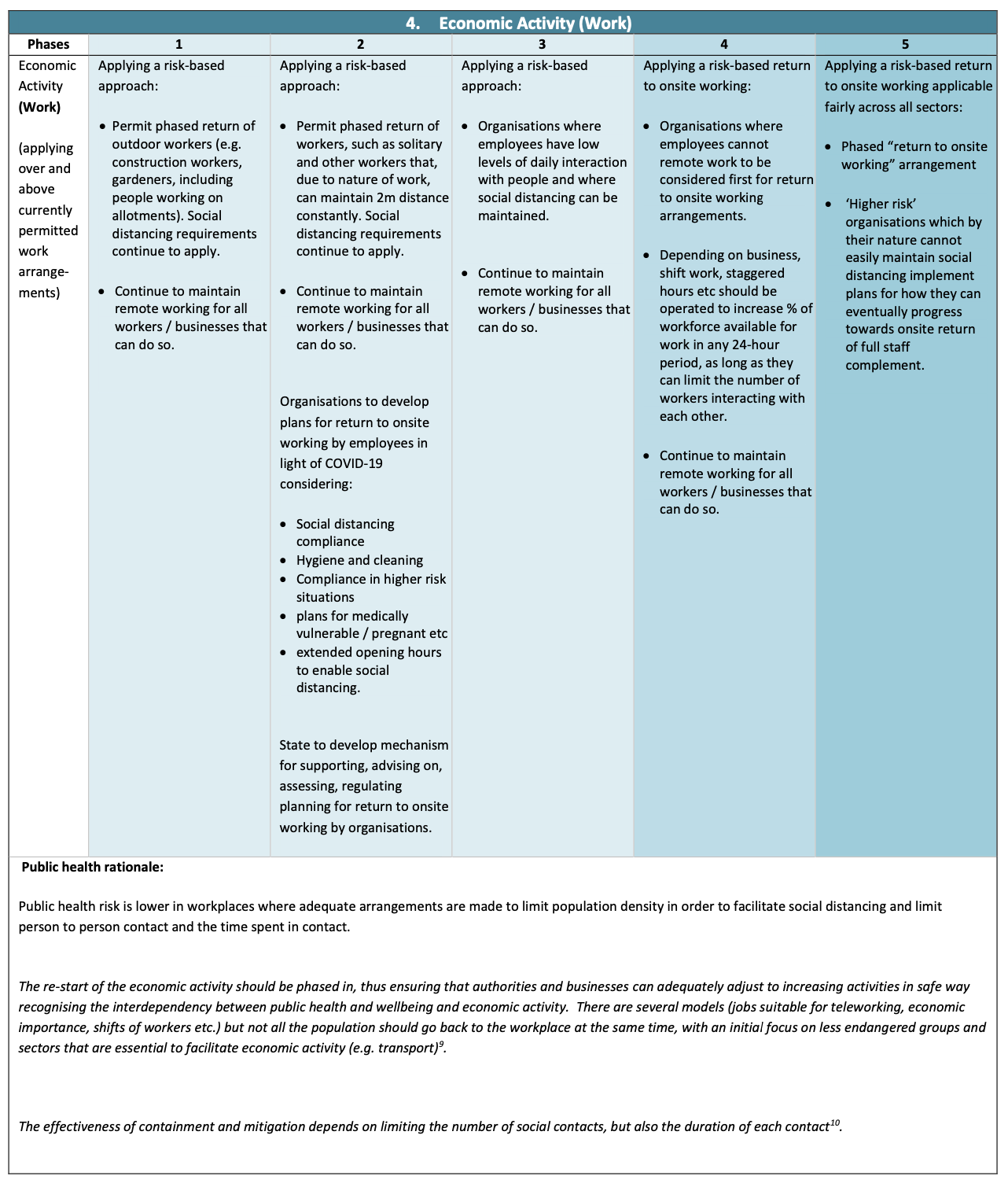
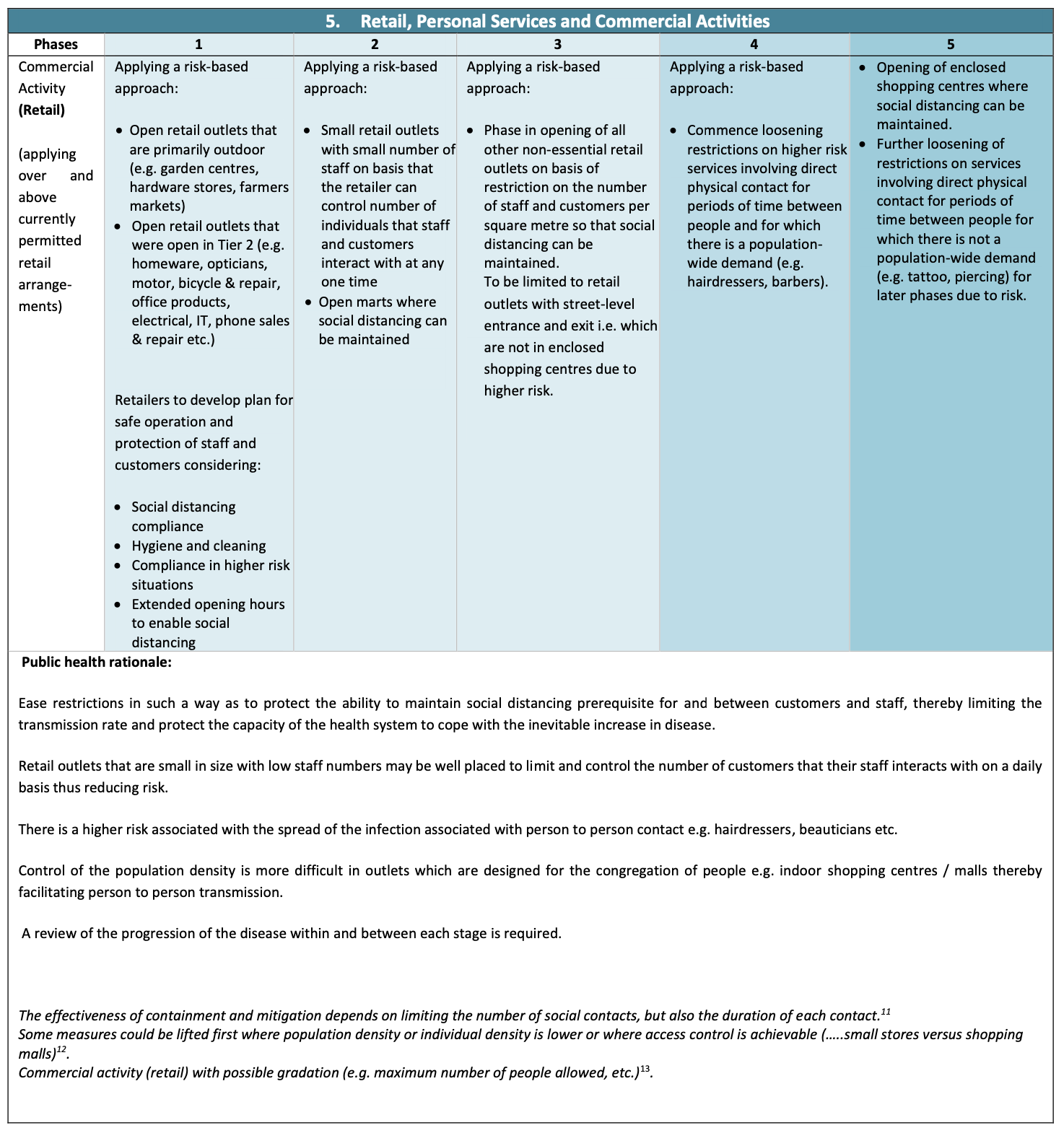
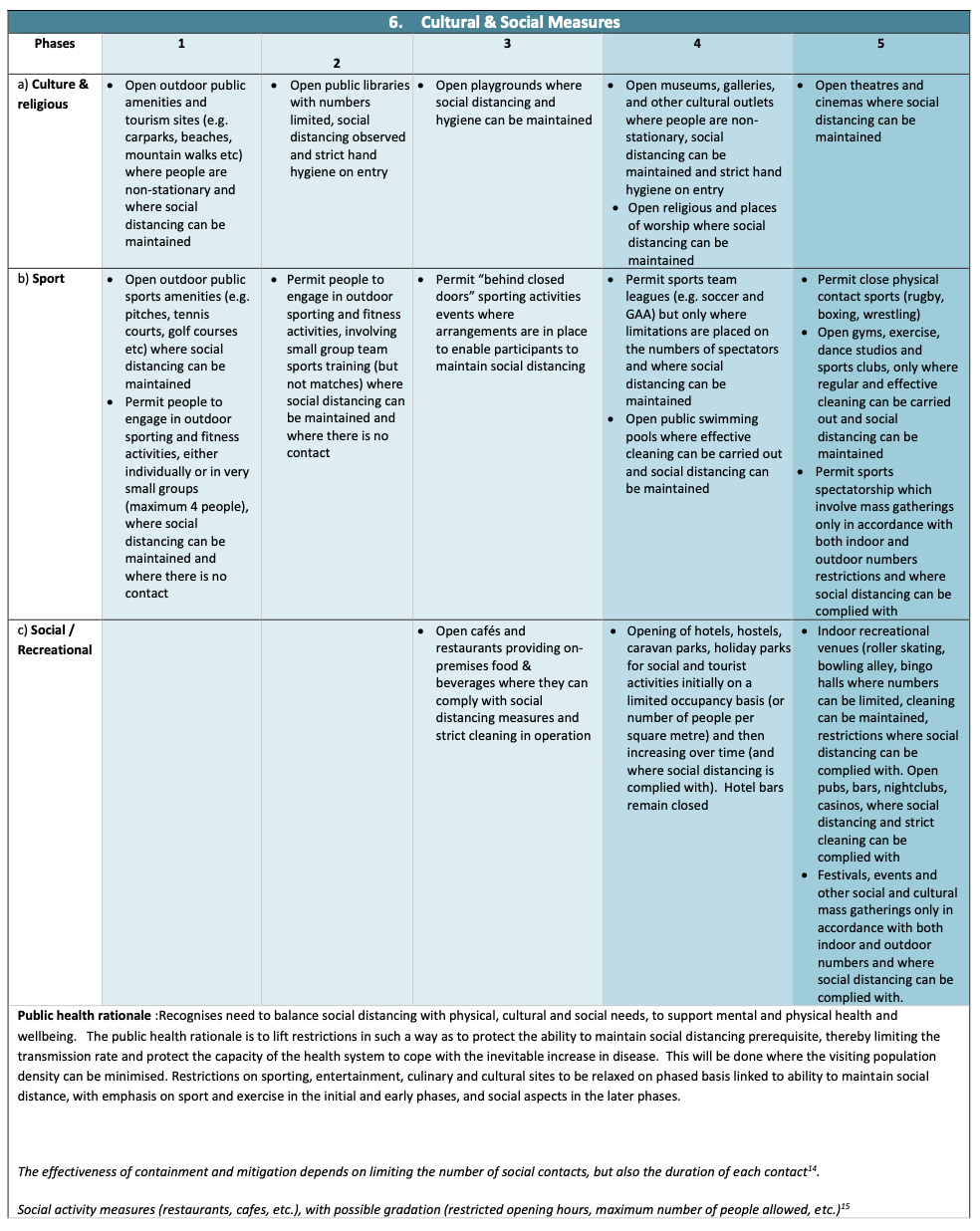
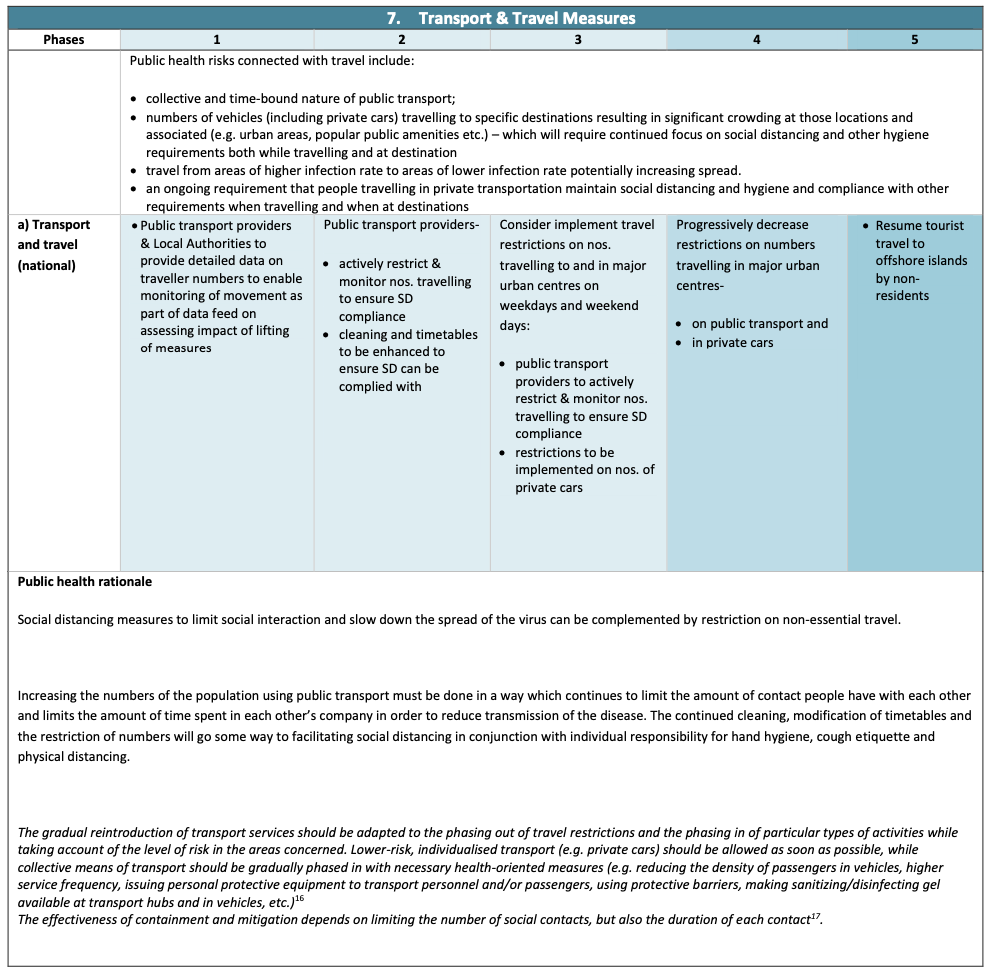
THE FRAMEWORK FOR FUTURE DECISION-MAKING
The introduction of tiered social-distancing measures had wide-ranging and multi-dimensional policy impacts. The kinds of restrictive measures that have been taken go beyond what we might normally do. These were led by clear public health advice, grounded in guidance, evidence and experience from international organisations and other countries.
Government will make regular assessments of the possibility of modifying the existing restrictions. The Public Health Framework and process set out below are a means of assessing how we can keep the level of transmission as low as possible, while balancing continuing restrictions proportionately with the positive social and economic benefits which can accrue from the lifting of some restrictions.
The decision-making framework will be as follows:
- Before each Government consideration of the easing of restrictions, the Department of Health will provide a report to the Government regarding the following on/off trigger criteria :
- The latest data regarding the progression of the disease
- The capacity and resilience of the health service in terms of hospital and ICUoccupancy
- The capacity of the programme of sampling, testing and contact tracing
- The ability to shield and care for at risk groups
- An assessment of the risk of secondary morbidity and mortality as a consequence ofthe restrictions.
- It will also provide risk-based public health advice on what measures could be modified in the next period.
- The Government would then consider what restrictions could be lifted, having regard to the advice of the Department of Health as well as other social and economic considerations, e.g. the potential for increased employment, relative benefits for citizens and businesses, improving national morale and wellbeing etc.
- It is acknowledged that there is also an ongoing possibility that restrictions could be re-imposed and this process will be carried out on an ongoing basis once every 3 weeks.
ENGAGING STAKEHOLDERS AND PROVIDING ASSURANCE
Preparedness to Re-open
To prepare for a return to operations, there is a need for overarching guidance to support business and services to mitigate any risks of infection; and an inevitable lead-in time will be required to prepare staff and premises to ensure physical distancing layouts and other resources are sourced and available.
The Government has already been working closely with employer and trade union representatives through the Labour Employer Economic Forum (LEEF) on a shared approach to a gradual re-starting of economic activity in a safe and measured way. This builds on the extensive work already undertaken by a number of bodies in providing guidance and advice to essential businesses during the initial period of the crisis. The Government also notes the preparatory work being undertaken by many individual groups, bodies and agencies to assess what safe re-opening of their sectors might look like, at the appropriate time. Many sectors have already provided us with their thinking and have demonstrated a considered approach and a very clear understanding of the requirements to keep people safe. This is in informing the overall approach.
The Department of the Taoiseach will arrange for a process of consultation through relevant Departments which will assist to flesh out how the Public Health Framework can be implemented effectively and safely across different sectors of the economy with an initial focus on measures to commence in the first phase of easing of restrictions.
As well as workplace arrangements, there has been engagement by relevant Departments on safe re-opening of community and other facilities, e.g. sporting and cultural activities, tourism sites, childcare centres, schools and universities etc. As with workplaces, the collective national impact of increasing access and mobility will have to be assessed, and not just the safety of the individual facility.
National Protocol
A National Protocol is being finalised by Government, employers and trade unions, with the assistance of the Health and Safety Authority, which will support a gradual restart of economic activity as restrictions are eased, while protecting the health and safety of workers as they return to work.
The Protocol is being developed following discussions at the Labour Employer Economic Forum (LEEF), which is the forum for high level dialogue between Government, Union and Employer representatives on matters of strategic national importance.
It will be necessary to determine the most effective type of inspection/enforcement regime that is required to achieve compliance across all business sectors. Employers, employees and the public at large will need to have confidence that they will continue to be protected in going about their business.
There are existing monitoring and enforcement mechanisms across a number of State Departments and Agencies. These mechanisms will need to evolve as the process of restarting economic activity develops in line with this Plan, and to take account of the specific issues which will arise across different areas of the economy.
There will also be a need for parts of the public service that deal with workplace issues to be re- organised and to get additional resources, whether through redeployment or additional recruitment. There is a role for both central and line Departments in developing these arrangements. This will have to be carefully designed so as to ensure coherence across Government.
UPDATED ECONOMIC POLICY RESPONSE
The global, and national, economic landscape has fundamentally changed in recent weeks, as large elements of economic activity have come to a standstill in an effort to suppress the transmission of the COVID-19 virus.
This profound shock means that Ireland’s GDP is projected to fall by 10.5% in 2020 resulting in a deficit of at least 7.5% of GDP and a further large deficit in 2021. Unemployment is expected to reach a peak of 22% in the second quarter before falling gradually. The overall economic cost of the crisis is unprecedented and the longer the public health restrictions are required, the greater these costs for the Economy and the Exchequer, with fundamental implications for the future of the public finances.
The Government’s overarching approach therefore is to ensure that economic activity recovers as quickly as possible, consistent with public health advice. The Government is working to limit business failures and workers lay-offs with timely, targeted and temporary supports for firms and workers; this is how the permanent or ‘scarring’ effects of the crisis will be minimised.
In taking these measures, the Government must also reflect on the affordability of these interventions, and the need to ensure that Ireland retains full confidence in its economic and fiscal position, while also ensuring that interventions are targeted in the most effective manner possible.
Measures introduced by the Government to date include:
- – the Temporary Wage Subsidy Scheme which aims to keep workers closely linked to the labour market, while providing immediate cash flow assistance to employers
- – the Pandemic Unemployment Payment to support the income of those who lose their jobs due to the crisis, as well as measures in relation to mortgages\rents
- – a series of enterprise supports including liquidity funding, loan schemes and grants\vouchers, as well as deferred tax payments, deferral of commercial rates to help maximise the survival rate of SMEsThe Government will also continue to work with the banking sector who have agreed to extend a six month payment break to customers that require continued support.As this Plan makes clear, the pathway back to resumption of a full level of economic activity will be lengthy and subject to considerable uncertainty.
Supports for Business
Recognising the pressures facing many sectors, in particular SMEs, which will not be able to re-open in the short-term based on the framework set out in this Plan, the Government will shortly introduce a number of additional measures to assist affected enterprises which are facing acute liquidity pressures as a result of the further extension of the shut-down period. It will also develop targeted measures to assist enterprises as and when sectors are permitted to re-open under the gradual relaxation of restrictions.
In developing its approach, the Government will ensure that Ireland makes maximum use of EU funding and support where available and appropriate, including the European Investment Bank.
As re-opening more sectors becomes possible, the Government will bring forward initiatives including a re-alignment of public capital investment under the National Development Plan, the promotion of the digital economy and remote working, while seeking to ensure Ireland is well- placed for what is likely to be a very different global and domestic economic paradigm.
Income Supports for Workers and Families
As outlined above, the Government has introduced extensive emergency supports to help retain workers in employment and provide income support to those who have lost their jobs due to the crisis. It has also introduced enhanced supports for those who can’t work due to being diagnosed with the disease or required to self-isolate, as well as additional support via the fuel allowance for pensioners.
These measures were a rapid response to the crisis, providing immediate income support to people affected and their families, at a very high cost to the Exchequer. These costs will not be sustainable over the longer term.
The Government is extending the emergency measures taken in relation to Illness Benefit and the waiver of waiting days for jobseeker payments, which were due to finish on the 9th of May, until 19th of June.
Between now and the end of May, the Government will be developing a roadmap for future labour market measures as we move towards a path of normalising the emergency interventions taken to date. This will take account of decisions to re-open certain sectors, the need to support people back into jobs as they become available as well as structural changes in the labour market.
RESPONSE ON OTHER PRESSING SOCIETAL CONCERNS
It is clear that there are significant consequences of social distancing measures. The normal structures of daily life – work, school, sport, entertainment – have temporarily ceased to exist and even as we re-open society, we will be living our daily lives in modified ways for as long as we live with this pandemic.
These restrictions affect different groups in different ways and to greater and lesser extents. Therefore, our assessment of risk must recognise that, in mitigating for risks of transmission of COVID-19 through social distancing restrictions, we are creating other challenges for individuals, families and communities. Some of these challenges are manageable in the very short term but as restrictions continue, the impact becomes greater for some groups.
In living with restrictions, the Government will take account of these balancing impacts and the particular consequences for more vulnerable groups in our society. The areas where social- distancing causes most concern include:-
- Non-COVID Health Delays
- Well-being and Mental Health
- Vulnerable Groups for whom Home is not a Safe Place
- Minorities and other Groups Disproportionately Impacted by the Restrictions
- Risk-taking Behaviour and Offending
- Crime and Policing & Access to Justice
Government Departments and agencies have been working to modify work practices and modes of delivery to meet with these challenges and this work will have to continue.
It is acknowledged that additional measures have to be taken to reach out to more vulnerable groups and those that are particular affected by the guidance on cocooning and social distancing. Some of these measures are already underway, through various cross-government efforts such as the Community Call, In this Together and Still Here initiatives and campaigns.
This focus on the particular difficulties that prolonged restrictions are having will need to continue and evolve as we work our way through a re-opening of society.
TRAVEL AND INTERNATIONAL CO-OPERATION
As the process for modifying restrictions proceeds, and as the international situation evolves, we need to continue to work intensively on our approach to travel restrictions and controls at ports and airports; and our co-operation with Northern Ireland, the UK and our EU partners.
Travel Restrictions and Controls and Airports and Ports
While we are making progress in our efforts to interrupt the spread of COVID-19 and to mitigate its effects, we are taking necessary additional steps to protect our communities from imported or community cases of COVID-19.
Government advice remains that all non-essential travel should be avoided. This includes travel both into and from Ireland.
From Friday, 24 April 2020, all passengers arriving in Ireland from overseas are expected to self- isolate for 14 days on entry into the State. Self-isolation means staying indoors and completely avoiding contact with other people and is a more stringent measure than the stay at home requirements that apply to the wider public. (In effect, arriving passengers are required to follow the same arrangements as persons who test positive or are known to have been in close contact with someone who has tested positive.)
Further, incoming passengers are, for the first time, being provided with a public health information leaflet and asked to complete a Public Health Passenger Locator Form, showing their contact details and the address at which they will self-isolate. The Form also allows for the operation of a system of spot checks to verify that incoming passengers are complying with self-isolation.
We must continue to recognise the severity of the threat of COVID-19, continue to be guided by the best evidence and advice available and continue to do what we have been doing. The WHO in recently issued strategic guidance, identified the management of imported cases as a key criterion to be satisfied by countries as they consider the unwinding of social distancing measures.
The new measures adopted are in keeping with expert advice and will be important in ensuring that the sacrifices we have all had to make to date are not undermined by complacency in other areas.
The issue of the imposition of mandatory quarantine for a 14 day period and testing on entry may need to be considered and will be kept under view.
Co-operation with Northern Ireland on an all-island approach
COVID-19 doesn’t respect national, political or geographic borders. It follows that international cooperation and coordination is a crucial element of the campaign to restrict and eradicate the virus.
This is particularly relevant in the case of an island, where coordination between the two jurisdictions can make a significant contribution to management of COVID-19. Close cooperation and, where possible, alignment of public health advice and policy decisions can contribute to more effective management and containment of the virus.
With this in mind, there is ongoing, close engagement with the Northern Ireland authorities in a variety of forums, at both official and political level, both on a North-South basis and as part of broader engagement with the United Kingdom.
The health administrations on both parts of the island have agreed a Memorandum of Understanding on Public Health Cooperation on COVID-19, which provides a framework for close consultation, coordination and cooperation. There are regular meetings on COVID-19 at political level, involving the Tánaiste and Minister for Foreign Affairs and Trade, the Secretary of State for Northern Ireland and the First Minister and deputy First Ministers of Northern Ireland. These meetings can also include the Health Ministers and Chief Medical Officers from Ireland and Northern Ireland.
This close coordination will continue, and intensify, over the coming weeks as we each move to reopen business and society.
Co-operation with the UK
Given the very close links between Ireland and Great Britain, there is also good engagement between the Irish and British Governments governments. This is particularly important in the context of the Common Travel Area, and the fact that both the UK and Ireland are not participants in the Schengen area of free movement. It is also important given the strong linkages of our respective economies and supply chains, both in terms of ensuring the continued supply of essential goods and services while, at the same time, seeking to manage any competitive divergences that may arise due to different approaches to the unwinding of economic restrictions.
We have ensured that strong consultation and flow of information takes place between our administrations in the initial phases of COVID-19. This sharing of information and consultation has helped to ensure that, in many areas, the approaches taken have been similar in both countries, and to share understandings and experiences where they differ.
Both countries have followed broadly similar approaches to the management of travel from abroad, which in part reflects the Common Travel Area.
As with Northern Ireland, this engagement takes place at a number of levels, both political and official. We will intensify this engagement over the coming weeks.
Co-operation with EU partners on re-opening borders and economic recovery
Ireland is participating fully in all EU-level discussions and decisions relating to COVID-19. Several ministers are actively participating in meetings with all of their counterparts. Thus far, there have been four meetings of the Heads of State and Government, in which the Taoiseach has participated each time, to oversee the EU response to the virus. These meetings take place by video conference.
The EU has coordinated action across a number of policy areas and responses:
- limiting the spread of the virus;
- procuring medical equipment;
- promoting research, including on vaccines;
- helping to repatriate EU citizens stranded abroad, and
- tackling the socio-economic impact.
Different EU countries are at different stages in terms of the spread, impact, and management of the disease. Some were hit earlier than others, and in some countries the impact and spread has been more severe. EU countries also have different capacities to respond, in terms both of their health systems and resources and of their public finances and economic situations.
The EU is working to provide a balanced, coordinated and effective response. The next phase of this work will focus on economic recovery and ensuring ongoing capacity of health systems. A number of instruments have already been agreed, in order to provide Member States, particularly those with more constrained public finances, with access to funding to support necessary policy decisions and actions.
Ireland will continue to participate fully in all of these discussions, in order to ensure that a coordinated approach is taken across the EU where that would be the most effective course of action. We will also seek to ensure that Ireland takes advantage of any relevant economic supports agreed and implemented at EU level.
Full Speech of An Taoiseach; Leo Varadkar
Good evening. I need to speak to you again about the coronavirus.
The last few weeks have changed and transformed our lives in so many different ways.
I know it has been difficult – sometimes dispiriting.
The frustration of having our lives restricted. The uncertainty about when things will get back to normal. The fear of the virus itself.
As a nation our physical health has been attacked, our mental health eroded, our economy battered, and our society put to the ultimate test.
Many people are lonely and enduring the pain of isolation. Many people are grieving in silence.
Many have lost their jobs. Many fear losing their businesses and many have lost their lives.
I know, for me, the worst part has been the daily text message at around 5.30 every evening with the latest number of notified deaths and newly diagnosed cases. I yearn for the day when it stops.
Tonight I want to explain to you why we have to extend current restrictions until the 18th May and also to share with you our plan to re-open our economy and society in phases starting on that day.
Thanks to you we are making a real difference in the fight against COVID-19. The curve has been flattened and it has now plateaued. Thousands of lives have been saved. Our hospitals and healthcare staff have not been overwhelmed.
But we have not yet won this fight. Every day we still have too many new cases. We still have too many people in hospital and in our intensive care units. Every day, regrettably, we still have too many deaths.
Our scientists and doctors tell us that if we relax the restrictions too soon, we could see, within a matter of days, our ICUs overcrowded, our care homes under renewed pressure, and our healthcare staff overwhelmed.
Everything we have achieved would be lost. Our best chance of winning this battle would be swept away and we could be back to square one.
So we must go on, for a short time more.
We have a plan to ease restrictions from 18th May. But before that we need two more weeks of tight restrictions to weaken the virus further, so it doesn’t have the strength to make a comeback when we start to interact with each other once again.
During this period we are making some change – we are extending the distance you can leave your home, so from next Tuesday it will be possible to go up to 5km for the purposes of exercise.
For people who are cocooning the public health advice is to continue to do so. However it will still be possible to go for a walk or a drive within 5 km of your home if you avoid all contact with other people.
Our plan is to re-open the country in a slow, staged, phased way.
Five stages, three weeks apart starting on May 18th and, all things going to plan, with the 5th phase commencing on August 10th.
Unfortunately the risk of a second wave of the virus is ever present. So we can only move from one phase to the next if the virus stays under control between each phase. And there is a risk that we’d have to go back a phase if that happens.
In any scenario, at least until we have a vaccine or effective treatment, there will be a long-term need for physical distancing, good hand hygiene, respiratory hygiene, regular cleaning and for people to stay at home and isolate if they are sick.
It will take some time for our lives to get back to normal. To a new normal. But it will happen.
So, on the 18th of May, Ireland begins to re-open and begins that journey to a new normal.
From that day, outdoor work like construction and landscaping will resume. Some retail outlets like garden centres, hardware stores, repair shops will re-open, and some outdoor sporting and fitness activities in small groups will be allowed.
Many regular health services will resume operating. And it will be possible to meet small groups of friends and family outdoors.
Not long from now, some summer night, we will see our friends again.
In later phases, other workplaces, businesses, childcare, pre-schools, restaurants, cafes and bars, cinemas and gyms will re-open.
Schools and colleges will reopen in September/October at the start of the new academic year.
Getting people back to work and re-starting businesses will not be easy. I know that. It won’t be possible for people to just pick up where they left off. Businesses are going to need help to get going again.
So, tomorrow, Cabinet will meet again to agree further actions to help our businesses to restart, reconnect and rehire staff who have been laid off or furloughed.
Separately, a National Protocol is being developed by Government, employers and trade unions, with the assistance of the Health and Safety Authority and the HSE.
This will enable a gradual restart of economic activity as restrictions are eased, while protecting the health and safety of workers as they return to work.
We will do everything possible to get enterprises back up and running, so you can get your job back.
While it will take some time before we get to enjoy again the things we are missing – from the comfort of our families to a night out with friends – those days will come again.
Over the last few weeks I have received about 10,000 pieces of correspondence and every day I try to set aside just a little bit of time just to read some of them. People sharing their hopes as well as their fears.
A letter from Jessica, who is a wheelchair user, who feels an enormous cloud of loneliness around her.
A letter from Anne Marie, a healthcare worker who contracted coronavirus at work and who answered her own question about why she put herself at risk.
She said her patients were like family; she said ‘they call us their best friends’.
A letter from Phil, a pensioner living alone, who admits to struggling with the isolation and lack of human contact and whose mental health is starting to suffer. Phil says that we have a long road ahead of us, but one worth taking if it means we all stay safe.
Rachel, aged 13, who is worried about her grandparents and wondering when she will be able to go back to school. Someone worried about the future but who ends her letter by asking me to stay safe.
We are doing this for Jessica, for Anne Marie, for Phil, for Rachel and for everyone else who is struggling as best they can to come through this crisis.
We are doing this for each other.
The coronavirus is cruel and inhumane.
However the stories I am hearing every day are stories of human kindness.
The kindness of healthcare, nursing home, hospice and hospital staff who have comforted and cared for the sick and dying with dignity at the most distressing time.
The tragedy of every death, whether linked to Covid or not, is made far worse by the fact that we have been unable to come together to mourn our loved ones or embrace and comfort each other as families.
But while we are unable to gather, we are still grieving.
And when we come through this we will come together as a nation and grieve together – for everyone who has died over the course of this emergency.
In every city, in every town, in every village, people have met the demands of this crisis with remarkable courage and a sense of solidarity.
We all know someone who is suffering because of these restrictions, just as we all know someone who is on the frontline or performing an essential service.
The best way of helping them is by staying the course, and continuing this fight.
So, tonight I am thinking of parents juggling work and home-schooling. The young people deprived of the companionship of their friends and of their opportunity to take part in sport. The couples who have had to cancel their weddings. The grandparents who crave the opportunity to hold their newly born grandchild. We all have our own stories and each one combines to form a tapestry of struggle, and sacrifice, and sorrow.
It has been worthwhile. It is working. So let’s finish what we started.
Thousands of lives have been saved.
Hundreds of thousands are healthy and untouched by coronavirus because of the sacrifices you have made.
70% of people diagnosed with COVID-19 have fully recovered because of the care and attention given to them by our health service.
That figure would have been much lower if we had been overwhelmed.
So while there is still so much we do not know, there is hope.
In the weeks ahead that hope will drive us forward as we plan to emerge safely from this crisis.
Thank you!
Want to ensure you’re staying within 5KM from home? Check out the handy website here: 2kmfromhome.com/5km/
Want to get €5, absolutely free? Sign up to the ‘Smart’ Debit Card – Curve today, and earn a fiver on us! Find out more here.


